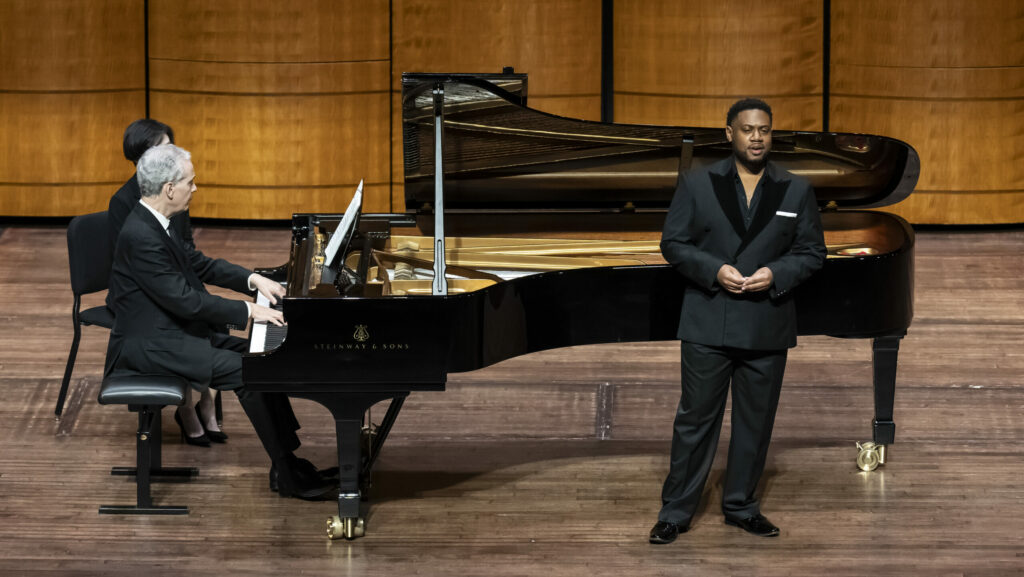
Scott Suchman
I am sure countertenors just love how often discussions of their work are accompanied by meta commentary on the overall state of the fach, comparisons with a short list of colleagues, and hot takes about whether countertenors are nice to listen to in the first place. So, apologies in advance to Key’mon Murrah, whose rather extraordinary Marian Anderson award recital with pianist Brian Zeger at the Kennedy Center on December 17 demands some general musing.
One could place Murrah, who made his Met debut in John Adams’s El Niño last season just a few years after his professional debut, in the crop of countertenors of the past decade or so that have sought to expand the boundaries of what the previous generation of Danielses and Scholls achieved. But to a greater degree than most in that class, Murrah challenges some of the more fundamental assumptions about how a countertenor is supposed to sound.
Perhaps most notable was a range of vocal coloring that far outstripped the previously often lean countertenor palette, adding a dimension of sonic depth and characterization uncommon in voices that tend to excel in a limited set of exquisite gears. Complementing this was a deep bench of spectacular vocal effects, with edgier, more brilliant high notes, and the dynamic range to back them up. Murrah’s ability to marshal these assets in the service of a strong interpretive vision made for a potent combination.
“Riedi al Soglio” from Rossini’s Zelmira made immediate use of Murrah’s ability to convey character through different vocal qualities, a veneer of demure restraint giving way to earthier sensuality. An explosive reading of the cabaletta featured top notes that had more in common with the stab of a coloratura soprano than that pure, opaque quality usually found at the top of the countertenor range.
An “Ombra Mai Fu” was the highlight of a Handel set, Murrah establishing his credibility in the greatest hits with stately phrasing and graceful piano effects. Murrah’s brother, the tenor Kay’mon Murrah, joined onstage for a brief duet from Handel’s Rinaldo, though didn’t have much to do in this selection, which was mostly distinguished by a few more delightfully ear-splitting high notes from the countertenor. Runs in “Dopo Notte” from Ariondante were a tad anemic to start but locked into place as the aria progressed, over sensitive contributions from Zeger.

Scott Suchman
A set of three Richard Strauss songs announced Murrah’s intent to make an impression not just in countertenor-coded material but the biggest recital program warhorses. Venerable chestnut “Morgen,” unfolded with exquisite control and a disarming intimacy, while Murrah was able to bring an overflowing sound to bear for the decadent passion of another Op. 27 selection, “Cacile,” and the ecstatic final stanza of “Allerseelen.”
The second half pushed further afield from countertenor home court, opening with a series of songs by contemporary composers. Adopting a leaner, more precise sound after the expansive Strauss, Ricky Ian Gordon’s “Will There Really Be a Morning,” on a text by Emily Dickinson was finely felt, Murrah wringing subtle insights from the reprise.
A trio of songs on texts by Langston Hughes followed, beginning with Gordon’s setting of “Joy,” the title and theme of the broader program. Murrah took a valiant run at the high lying range but couldn’t keep this from sounding effortful and a bit forced against Zeger’s playful handling of the piano part. A powerful stillness and focus in the reprise of Leslie Adam’s setting of “Prayer” elicited the audience’s rapt attention.
The final Hughes offering, a setting of “Mother to Son” by Meilina Tsui, was the most on the nose of the three, the musical theater-inflected writing lending a pat inspirational gloss to the mother’s weary monologue. Another head-turning climax aside, Murrah couldn’t do much to distinguish this selection.
Murrah closed with pristine interpretations of a pair of spirituals, Jacqueline Hairston’s arrangement of “Don’t Feel No-Ways a Tired” and Florence Price’s arrangement of “My Soul’s Been Anchored in the Lord.” These were about as good as renditions of spirituals in the concert setting can be, the vocalism precise and finely calibrated for effect while seamlessly weaving in embellishments and characteristic details integral to the music. Continuing in a spiritual vein for the encore, Murrah delivered a stunning rendition of “I Trust in God” without accompaniment.


